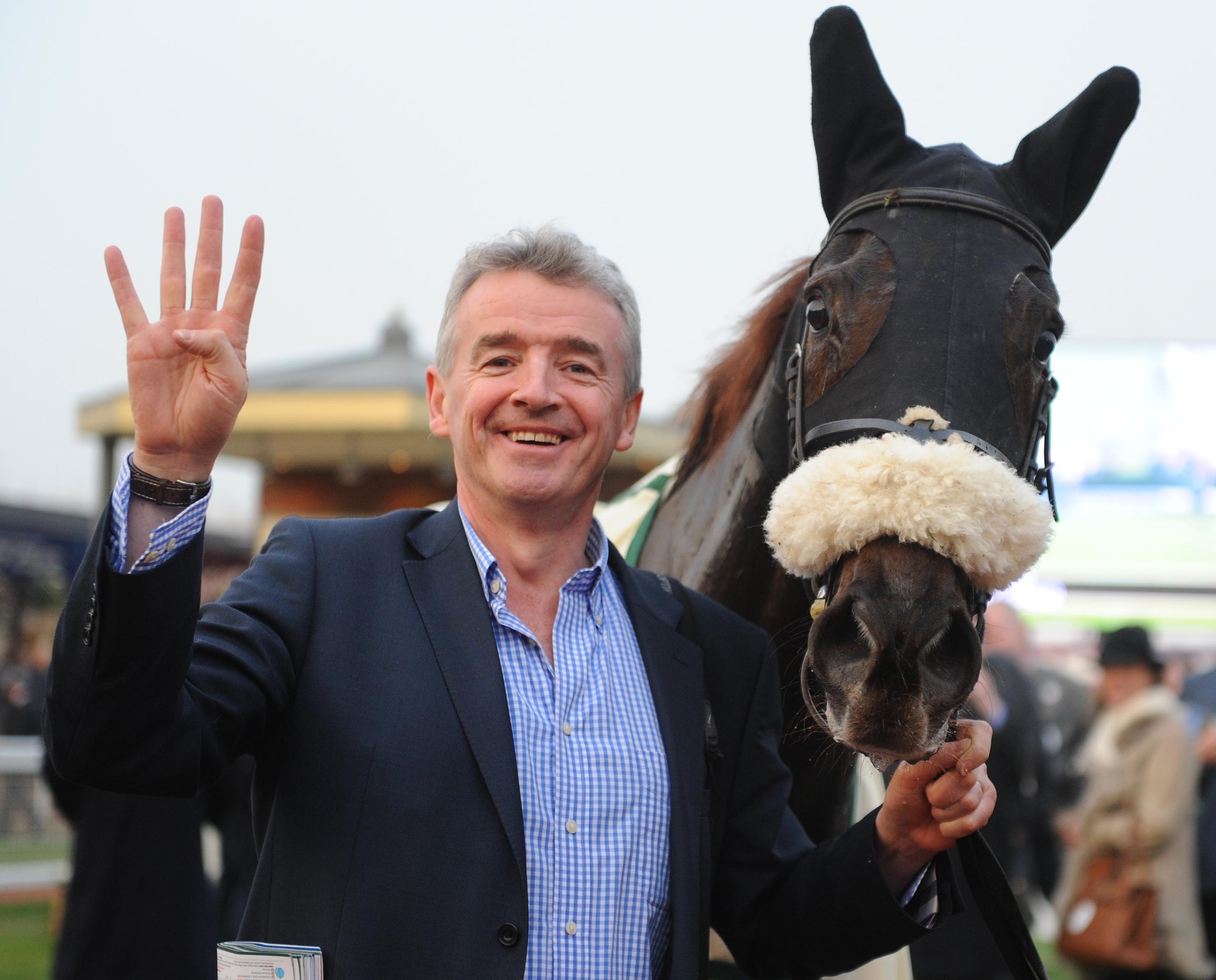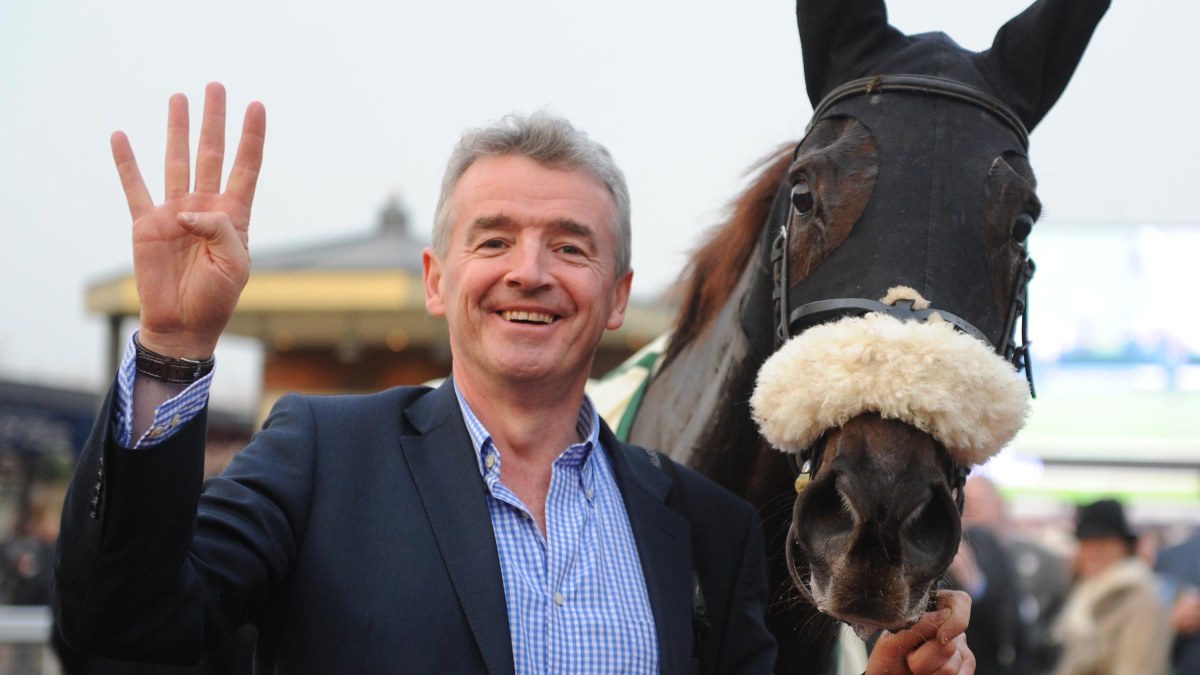I’ve witnessed Ryanair chief Michael O’Leary effing and jeffing about government ministers, deriding passengers and lambasting rivals on countless occasions over the years. Over cups of coffee, the proudly Irish executive has revealed the ignominy of having to buy one of his children an England cricket jersey, offered advice on handling my daughters when they are teenagers, and batted back pleas for tips from his champion thoroughbred stud.
Yet even though this is a man whose horses have triumphed at the Grand National and Cheltenham Gold Cup, I’d never thought to ask him about horse racing’s long-established ties with gambling. My assumption was that as the boss of a budget airline known for foisting scratchcards on its hemmed-in customers, he’d be a fan. How wrong I was.
“I think the gambling companies run a dreadful model that is exploiting the most exploitable people,” he told me last week. “Ultimately, horse racing is one of the more acceptable forms of gambling. [But] these fixed-odds betting terminals, the online gambling, the casino gambling, should just be f***ing outlawed.”

O’Leary celebrates having four winners in a day at Cheltenham in 2014. He is highly critical of betting companies
PAT HEALY/RACING FOTOS/REX FEATURES
Britain’s gambling sector — and by extension, the country’s horse-racing industry — is now back in the spotlight as Rachel Reeves weighs hefty tax increases this autumn. This comes at the behest of former prime minister Gordon Brown — ironically part of the New Labour government that oversaw the sweeping relaxation of gambling laws in the mid-2000s in the first place — and think tanks that reckon doing so is a great way to raise much-needed money for the exchequer.
• Labour should atone for its gambling sins
The tax hike proposals are multi-faceted. But broadly, they envisage increasing duties on “gaming” products such as roulette, blackjack and slot machines from 21 per cent (if online) or 20 per cent (if in shops, pubs and the like) to 50 per cent. It is claimed that the changes could generate an additional £3.2 billion for the exchequer.
They also envisage sparing horse racing from increased levies. Nevertheless, fears persist over the Treasury’s proposals to harmonise — bring all the rates into line with one another — the UK’s gambling tax regime. Such is the fear in horse racing circles about the threat posed by the changes that bosses will next week take the unprecedented step of going on strike, cancelling all British meets on September 10 in protest.
• Plan for betting tax will kill racing, warn sport’s chiefs
On the face of it, increasing tax on online betting products looks eminently sensible. Yes, not everyone will agree that peddling these fixed-odds games is “the filthiest money in all capitalism”, as one commentator has claimed. But many people will have sympathy with the view that the net impact on society is undoubtedly negative. I agree.
The problem is that there could be serious unintended consequences from implementing a fiscal solution to an ethical and moral dilemma. Moreover, the blunt instrument of increasing taxes is an analogue approach in a digital world and, probably, is doomed to fail as a result.
Bookmakers are not stupid. An increase in tax will not reduce their returns; rather, it will reduce the odds and promotions that licensed operators can offer to maintain their profit margins.
But hold your horses — that’s good news, isn’t it?
Not necessarily. Like the bookies, punters are savvy too; they are on the hunt for the best odds in the market. If the offers from licensed operators are significantly worse than those they can find from unlicensed counterparts, more and more people will be driven to the curious names that can often be seen on the front of football shirts. They are not hard to find: 11 of the Premier League’s 20 sides have betting companies on their jerseys, and some of these do not have a UK licence.
So as consumers move from licensed betting products to unlicensed ones based offshore, the risk is that the tax take falls, rather than increases — which seems to be happening in the Netherlands.
The Dutch increased gambling taxes by about 4 per cent to 34.2 per cent at the start of the year. This has resulted in tax revenues being 83 per cent of what was collected over the same period in 2024, according to the Dutch gambling regulator.
• Tax changes ‘threaten future of horse racing’
Meanwhile, a wider crackdown across continental Europe is leading to the rapid growth of illicit operators. Illegal betting websites took 71 per cent of all of Europe’s online betting and casino market last year, according to a report by the intelligence platform Yield Sec.
Then there is the argument that the finances of the horse racing industry will be harmed. Pressure on profit margins as a result of increased levies on online gaming means there will be less promotional and marketing money to spend on sponsoring horse racing, say senior figures in the sector. In other words, even if the industry escapes the tax rises, hikes on other forms of gambling could have profound implications for its finances.
Before you say it, I know this all sounds like I’ve drunk the betting industry’s Kool-Aid. Perhaps I have, to a degree. But the potential for negative fallout from increasing gambling taxes must be considered carefully and dispassionately. Simply hiking levies as a way to fill a budgetary shortfall would be short-sighted.
Ever more in the age of the internet, the gambling industry is able to exploit the most exploitable people — just as O’Leary says. But do I think big increases in taxes on licensed operators is the answer right now? No. Because the unintended consequences may be far worse.

